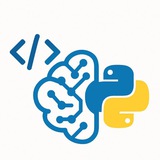The Big Book of Large Language Models by Damien Benveniste
✅ Chapters:
1⃣ Introduction
🔢 Language Models Before Transformers
🔢 Attention Is All You Need: The Original Transformer Architecture
🔢 A More Modern Approach To The Transformer Architecture
🔢 Multi-modal Large Language Models
🔢 Transformers Beyond Language Models
🔢 Non-Transformer Language Models
🔢 How LLMs Generate Text
🔢 From Words To Tokens
1⃣ 0⃣ Training LLMs to Follow Instructions
1⃣ 1⃣ Scaling Model Training
1⃣ 🔢 Fine-Tuning LLMs
1⃣ 🔢 Deploying LLMs
Read it: https://book.theaiedge.io/
Read it: https://book.theaiedge.io/
#ArtificialIntelligence #AI #MachineLearning #LargeLanguageModels #LLMs #DeepLearning #NLP #NaturalLanguageProcessing #AIResearch #TechBooks #AIApplications #DataScience #FutureOfAI #AIEducation #LearnAI #TechInnovation #AIethics #GPT #BERT #T5 #AIBook #AIEnthusiast
https://t.me/CodeProgrammer
Please open Telegram to view this post
VIEW IN TELEGRAM
👍17❤4👎1
👨🏻💻 If you want to become a data science professional, follow this path! I've prepared a complete roadmap with the best free resources where you can learn the essential skills in this field.
#ArtificialIntelligence #AI #MachineLearning #LargeLanguageModels #LLMs #DeepLearning #NLP #NaturalLanguageProcessing #AIResearch #TechBooks #AIApplications #DataScience #FutureOfAI #AIEducation #LearnAI #TechInnovation #AIethics #GPT #BERT #T5 #AIBook #AIEnthusiast
https://t.me/CodeProgrammer
Please open Telegram to view this post
VIEW IN TELEGRAM
👍35❤18👏1
Foundations of Large Language Models
Download it: https://readwise-assets.s3.amazonaws.com/media/wisereads/articles/foundations-of-large-language-/2501.09223v1.pdf
#LLM #AIresearch #DeepLearning #NLP #FoundationModels #MachineLearning #LanguageModels #ArtificialIntelligence #NeuralNetworks #AIPaper
Download it: https://readwise-assets.s3.amazonaws.com/media/wisereads/articles/foundations-of-large-language-/2501.09223v1.pdf
#LLM #AIresearch #DeepLearning #NLP #FoundationModels #MachineLearning #LanguageModels #ArtificialIntelligence #NeuralNetworks #AIPaper
👍9🔥3💯1
#DataScience #HowToBecomeADataScientist #ML2025 #Python #SQL #MachineLearning #MathForDataScience #BigData #MLOps #DeepLearning #AIResearch #DataVisualization #PortfolioProjects #CloudComputing #DSCareerPath
✉️ Our Telegram channels: https://t.me/addlist/0f6vfFbEMdAwODBk📱 Our WhatsApp channel: https://whatsapp.com/channel/0029VaC7Weq29753hpcggW2A
Please open Telegram to view this post
VIEW IN TELEGRAM
❤15👍5🔥2
Anyone trying to deeply understand Large Language Models.
Checkout
by Tong Xiao & Jingbo Zhu. It’s one of the clearest, most comprehensive resource.
⭐️ Paper Link: arxiv.org/pdf/2501.09223
Checkout
Foundations of Large Language Models
by Tong Xiao & Jingbo Zhu. It’s one of the clearest, most comprehensive resource.
#LLMs #LargeLanguageModels #AIResearch #DeepLearning #MachineLearning #AIResources #NLP #AITheory #FoundationModels #AIUnderstanding
✉️ Our Telegram channels: https://t.me/addlist/0f6vfFbEMdAwODBk📱 Our WhatsApp channel: https://whatsapp.com/channel/0029VaC7Weq29753hpcggW2A
Please open Telegram to view this post
VIEW IN TELEGRAM
❤14
Forwarded from Data Science Machine Learning Data Analysis
mcp guide.pdf.pdf
16.7 MB
A comprehensive PDF has been compiled that includes all MCP-related posts shared over the past six months.
(75 pages, 10+ projects & visual explainers)
Over the last half year, content has been published about the Modular Computation Protocol (MCP), which has gained significant interest and engagement from the AI community. In response to this enthusiasm, all tutorials have been gathered in one place, featuring:
* The fundamentals of MCP
* Explanations with visuals and code
* 11 hands-on projects for AI engineers
Projects included:
1. Build a 100% local MCP Client
2. MCP-powered Agentic RAG
3. MCP-powered Financial Analyst
4. MCP-powered Voice Agent
5. A Unified MCP Server
6. MCP-powered Shared Memory for Claude Desktop and Cursor
7. MCP-powered RAG over Complex Docs
8. MCP-powered Synthetic Data Generator
9. MCP-powered Deep Researcher
10. MCP-powered RAG over Videos
11. MCP-powered Audio Analysis Toolkit
(75 pages, 10+ projects & visual explainers)
Over the last half year, content has been published about the Modular Computation Protocol (MCP), which has gained significant interest and engagement from the AI community. In response to this enthusiasm, all tutorials have been gathered in one place, featuring:
* The fundamentals of MCP
* Explanations with visuals and code
* 11 hands-on projects for AI engineers
Projects included:
1. Build a 100% local MCP Client
2. MCP-powered Agentic RAG
3. MCP-powered Financial Analyst
4. MCP-powered Voice Agent
5. A Unified MCP Server
6. MCP-powered Shared Memory for Claude Desktop and Cursor
7. MCP-powered RAG over Complex Docs
8. MCP-powered Synthetic Data Generator
9. MCP-powered Deep Researcher
10. MCP-powered RAG over Videos
11. MCP-powered Audio Analysis Toolkit
#MCP #ModularComputationProtocol #AIProjects #DeepLearning #ArtificialIntelligence #RAG #VoiceAI #SyntheticData #AIAgents #AIResearch #TechWriting #OpenSourceAI #AI #python
✉️ Our Telegram channels: https://t.me/addlist/0f6vfFbEMdAwODBk📱 Our WhatsApp channel: https://whatsapp.com/channel/0029VaC7Weq29753hpcggW2A
Please open Telegram to view this post
VIEW IN TELEGRAM
❤13👨💻2🎉1
🤖🧠 The Art of Scaling Reinforcement Learning Compute for LLMs: Top Insights from Meta, UT Austin and Harvard University
🗓️ 21 Oct 2025
📚 AI News & Trends
As Large Language Models (LLMs) continue to redefine artificial intelligence, a new research breakthrough has emerged from Meta, The University of Texas at Austin, University College London, UC Berkeley, Harvard University and Periodic Labs. Their paper, titled “The Art of Scaling Reinforcement Learning Compute for LLMs,” introduces a transformative framework for understanding how reinforcement learning ...
#ReinforcementLearning #LLMs #AIResearch #Meta #UTAustin #HarvardUniversity
🗓️ 21 Oct 2025
📚 AI News & Trends
As Large Language Models (LLMs) continue to redefine artificial intelligence, a new research breakthrough has emerged from Meta, The University of Texas at Austin, University College London, UC Berkeley, Harvard University and Periodic Labs. Their paper, titled “The Art of Scaling Reinforcement Learning Compute for LLMs,” introduces a transformative framework for understanding how reinforcement learning ...
#ReinforcementLearning #LLMs #AIResearch #Meta #UTAustin #HarvardUniversity
❤1🎉1
